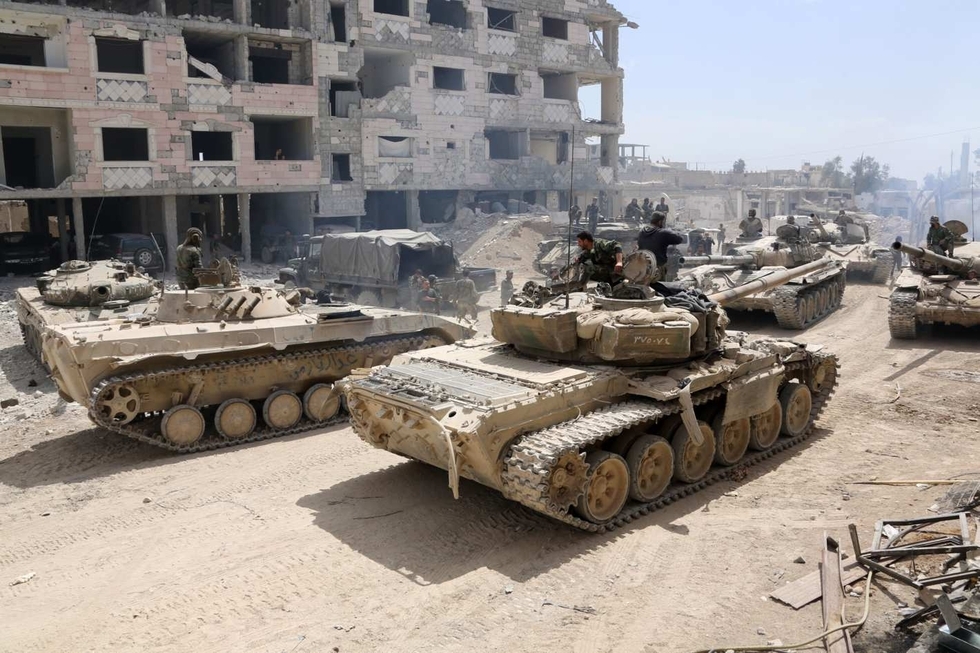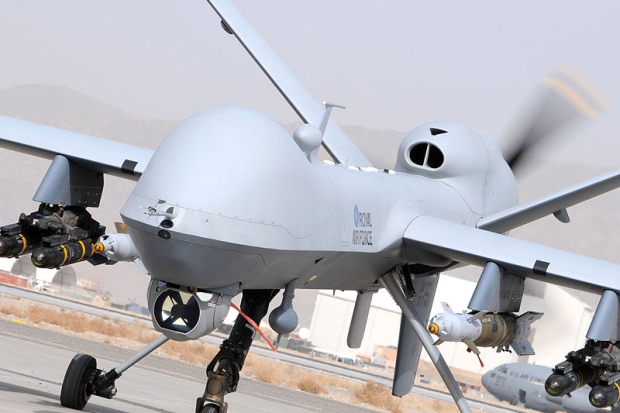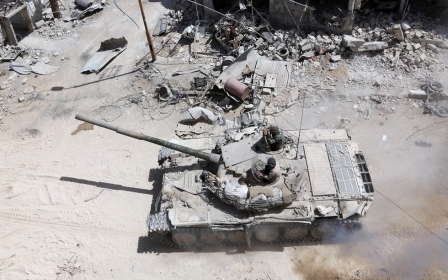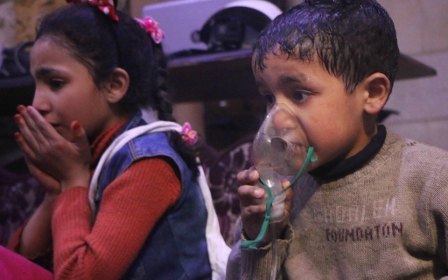Syrian opposition: UK must join US-led strikes against Assad

LONDON - Prime Minister Theresa May should order British forces to join US-led military strikes against President Bashar Al-Assad, Syrian opposition activists and rights groups have told Middle East Eye.
The US and France are leading calls for retaliation against Assad's forces for Saturday’s suspected chemical weapons attack in Douma, in which at least 40 people including children were killed.
And in the UK, there is increasing pressure from ministers, allies and Syrian opposition groups for the British government to join any planned US-led strikes against Assad’s forces.
“Force is the only language that the Assad regime understands. We need to see Syrian civilians protected and military action to destroy Assad’s chemical weapons, aircraft and tanks is the only solution,” Fadel Abdul Ghany, chairman of the Syrian Network for Human Rights, told MEE.
Speaking from Brussels, where he was meeting with exiled Syrian opposition groups, he added that “random bombing without a strategy” was not the solution, and instead called for a “long-term strategy” and air campaign to erode Assad’s military power, weaken the influence of his "Iranian backers" and to “force” the Syrian leader to the negotiating table.
On Monday the British prime minister said that President Assad and Russia would be “held to account... if they are found responsible” for the “barbaric” attack in Douma, prompting speculation that the UK may join US-led strikes against the government.
'Force is the only language that the Assad regime understands'
- Fadel Abdul Ghany, chairman of the Syrian Network for Human Rights
Last April, Donald Trump authorised the use of 59 US Tomahawk cruise missiles to hit Syria’s Shayrat airbase, after planes from the base were linked to a deadly sarin attack in the Idlib town of Khan Sheikhun.
However, the US response to that chemical attack was largely symbolic, and Syrian groups fear that any fresh strike would again be little more than a "one-off" move, not a more ambitious and co-ordinated attempt to destroy Syria’s chemical weapons stockpile and weaken Assad’s military, amid reports that Trump is committed to taking all remaining US troops out of Syria.
A broad campaign against Assad?
A source close to the leadership of the Syrian Negotiation Commission (SNC) told MEE on Tuesday that it would welcome US-led air strikes against Assad’s forces, including his chemical weapons facilities, as well as conventional military hardware, but that any strikes needed to be part of a broader campaign to weaken Assad.
Following Saturday’s attack, Nasr al-Hariri, president of the SNC, called for the international community to “enforce red lines and protect civilians”, but the SNC source went further, saying that US-led strikes should go beyond a “one-off” retaliation and include a sustained campaign to protect civilians by striking Assad’s military machine.
“The largest killing tools in Syria have been conventional weapons. Take away those lethal assets and you can force the regime to the table,” the source said.
Husam Alkataby, executive director of the Violations Documentation Centre, a Syrian human rights monitor, has also called for a "sustained, comprehensive response that deters all indiscriminate attacks”, whether from chemical or conventional weapons.
“The international community cannot let another massacre by the Assad regime go unpunished. It is crucial that the EU and others impose credible consequences on Assad’s military and his backers to deter further atrocities and bring this horrific conflict to an end,” he said in a statement on Monday evening.
Syrian political opposition groups have consistently called for air strikes against Assad’s forces, but Saturday’s chemical weapons attack has placed renewed focus on Western military intervention.
Syrian opposition groups are taking heart from early signs that France and the UK, as well as senior figures on both sides of the US Congress, are calling for a broad sustained campaign of air strikes, amid pressure on Trump to rethink plans to withdraw US troops.
Trump has a new secretary of state and national security adviser who may be more hawkish on the Syrian issue and see the US presence in the country as a lever against Russia and Iran, but critics say the US president “hasn’t articulated” his “goals in Syria” and that any strike would take place against the backdrop of cuts in US support for opposition groups, humanitarian aid and refugees.
Trump has said he will respond “forcefully”, as officials in the UK are reportedly preparing options for military action, including the possible use of Tomahawk missiles fired by a Royal Navy submarine.
The UK also has Royal Air Force jets in the region that are capable of supporting US-led strikes with Storm Shadow cruise missiles. It could also contribute Rivet Joint or Sentinel reconnaissance aircraft.
Foreign Secretary Boris Johnson, who said in February that the UK should consider military action in response to proven chemical attacks in Syria, is among the ministers urging May to take part in US-led strikes, the Times reported on Tuesday.
“We can be legalistic, or we can be realistic. These [bombs] were dropped by aircraft. Only one side has an air force,” said Tom Tugendhat MP, Conservative chairman of the foreign affairs committee, who urged May to “stick with your allies”.
Calls for the British prime minister to act came as former Labour prime minister Tony Blair said the UK should support US action.
He told BBC Radio 4's Today programme on Tuesday: "I think it is important provided that our advice about the source of the attack is the same as that of US that we would support US action. Meaning if the US are taking action we should be prepared to be alongside them."
Asked if Theresa May needed to ask Parliament if she took military action to support the US, Blair said: "I think in circumstances where the action presumably would be a form of air action rather than ground force action, I don't think strictly it's necessary... I think this is something that she can consider."
He added: "I think if the Americans are prepared to act and are going to act fast, I think ourselves, probably the French government will be in the same position, should be supportive, because it's important that when chemical weapons are used in this way and the international community has taken a firm position against it, that you have to enforce it."
Backbench and Labour opposition?
Syrian opposition figures say military intervention would be legal under UN Security Council resolution 2118, which called on the international community to take action if the Assad government used chemical weapons.
However, UK military involvement in any planned action will face opposition in Westminster where May could face resistance from some members of her own party, including four ministers in her cabinet - Steve Baker, Tracey Crouch, David Davis and Phillip Lee - who voted against military action in Syria in 2013.
UK action would not be covered by two parliamentary votes for air strikes on Islamic State in Iraq and Syria, and would likely spark a fierce debate over the British prime minister's power to involve the UK in armed conflict without a vote in Parliament.
Labour leader Jeremy Corbyn has also called for the UN to be allowed to investigate the chemical attack, while shadow foreign secretary Emily Thornberry has said any action must take place after a full investigation and be approved by the UN.
Asked on Monday whether he thought Parliament should be recalled from its Easter break to decide on any military intervention in Syria, Corbyn told journalists: "Well, at the moment there is no decision to intervene, or not.
"I think the intervention ought to be to support the United Nations in undertaking an investigation into the chemical weapons attack. That's what the UN has called for.
"But, also, there has to be a political solution in Syria. That does mean the US and Russia, instead of engaging in megaphone diplomacy across the floor of the Security Council, saying they will support the reconvening of the Geneva talks and all the countries in the region getting round the table together."
On Monday night at the UN in New York, Russian diplomats labelled the Douma attack as “fake news” and said it was invented to distract from the Salisbury nerve agent attack last month. Ambassador Vassily Nebenzia also accused Syrian rebel groups of staging chemical attacks with the help of US troops.
New MEE newsletter: Jerusalem Dispatch
Sign up to get the latest insights and analysis on Israel-Palestine, alongside Turkey Unpacked and other MEE newsletters
Middle East Eye delivers independent and unrivalled coverage and analysis of the Middle East, North Africa and beyond. To learn more about republishing this content and the associated fees, please fill out this form. More about MEE can be found here.





